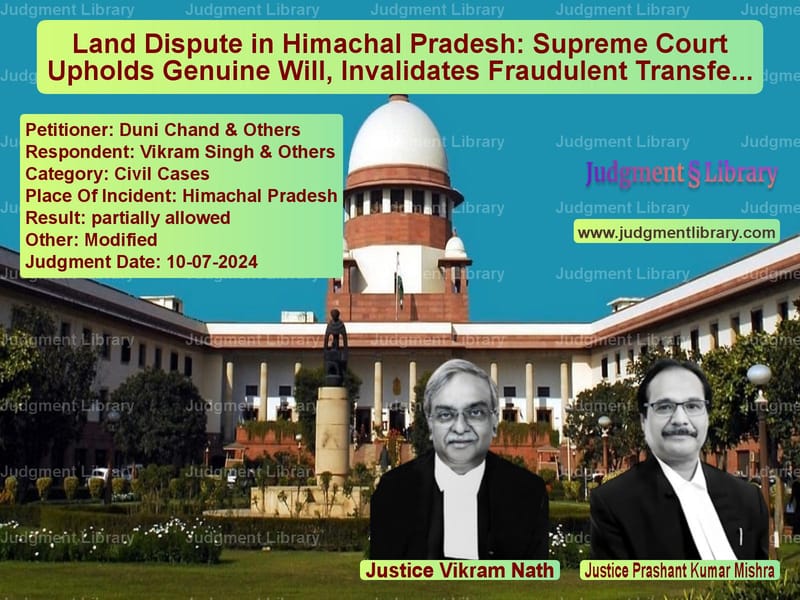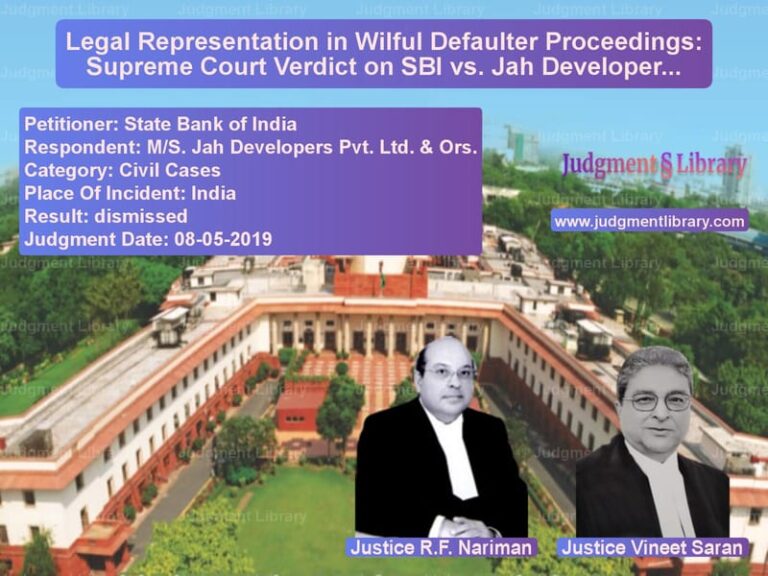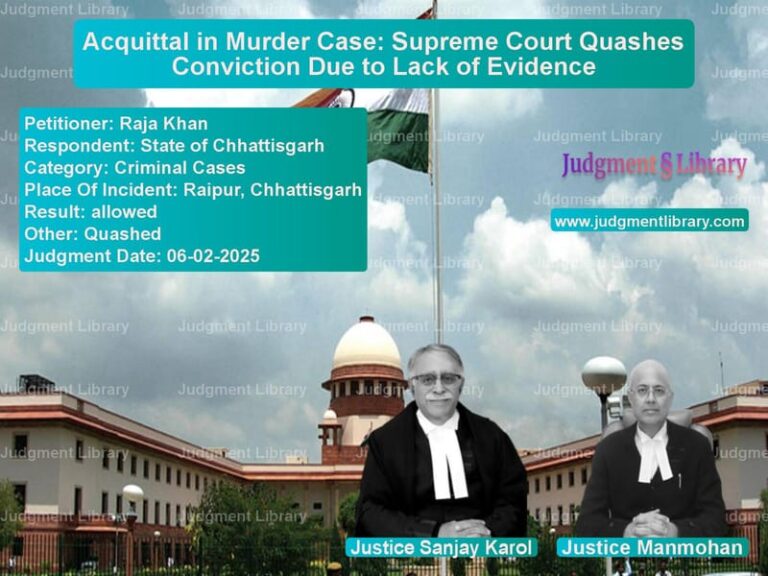Land Dispute in Himachal Pradesh: Supreme Court Upholds Genuine Will, Invalidates Fraudulent Transfers
The Supreme Court of India recently delivered a landmark judgment in the case of Duni Chand & Others vs. Vikram Singh & Others, resolving a long-standing dispute over inheritance and property transfers in Himachal Pradesh. The case revolved around two conflicting wills executed by the late Beli Ram, one in 1988 in favor of his nephew, Tota Ram, and another in 1994 in favor of Vikram Singh. The Supreme Court ultimately ruled in favor of Tota Ram’s legal heirs, declaring the 1988 will valid while invalidating the 1994 will.
Background of the Case
The dispute began after the death of Beli Ram, who owned agricultural land in Himachal Pradesh. Following his demise, two different wills emerged:
- Will dated 12.12.1988: Executed in favor of Tota Ram, who had cared for Beli Ram for over three decades.
- Will dated 16.05.1994: Allegedly executed in favor of Vikram Singh, a distant relative who later mutated the land in his name and sold portions to third parties.
Following the land mutation based on the 1994 will, Tota Ram initiated legal proceedings to challenge its validity and assert his ownership under the 1988 will.
Legal Issues Considered
- Which of the two wills—1988 or 1994—was legally valid?
- Was the transfer of land based on the 1994 will legally binding?
- Did the third-party purchasers have a legitimate claim to the land?
Arguments by the Petitioner (Tota Ram’s Legal Heirs)
- Beli Ram executed the 1988 will in a sound mental state and with free will.
- The 1994 will was forged and surrounded by suspicious circumstances.
- Vikram Singh fraudulently mutated the land and sold portions to third parties.
- The purchasers had prior knowledge of the dispute and were not bona fide buyers.
Arguments by the Respondents (Vikram Singh & Others)
- The 1994 will was legally registered and superseded the 1988 will.
- The sale transactions made after the mutation were valid and lawful.
- The purchasers acted in good faith and had no reason to doubt the legality of the transaction.
Trial Court Judgment
The trial court ruled in favor of Vikram Singh, dismissing Tota Ram’s claim. It upheld the validity of the 1994 will and recognized the legitimacy of land transfers based on it.
First Appellate Court Judgment
The first appellate court overturned the trial court’s ruling, holding:
- The 1988 will was valid and legally executed.
- The 1994 will was invalid as it was surrounded by suspicious circumstances.
- The land mutation based on the 1994 will was void.
- The third-party buyers had no legitimate claim to the land.
High Court Judgment
The High Court upheld the first appellate court’s ruling but granted relief to third-party buyers under Section 41 of the Transfer of Property Act, reasoning that they were bona fide purchasers.
Supreme Court Judgment
The Supreme Court ruled entirely in favor of Tota Ram’s legal heirs and held:
- The 1988 will was genuine and legally enforceable.
- The 1994 will was fraudulent and invalid.
- The land mutation in Vikram Singh’s favor was null and void.
- The third-party buyers had no legal claim as the original transfer was fraudulent.
The Court ruled:
“Once the Will itself was held to be invalid, no right accrued in favor of defendant no.1, and if defendant no.1 did not receive any right, title, or interest under the Will dated 16.05.1994, there was no question of defendants 2, 4, and 5 getting any better right.”
Key Takeaways from the Judgment
- Protection of Genuine Heirs: The ruling reinforces that valid wills executed without coercion will be upheld by courts.
- Burden of Proof in Will Disputes: Courts will scrutinize suspicious wills more strictly.
- Invalidation of Fraudulent Transfers: Ensures land buyers conduct due diligence before purchasing.
Conclusion
The Supreme Court’s ruling in this case is a landmark judgment in property and inheritance law. It underscores the importance of ensuring fair and legal transfer of property based on valid wills and prevents fraudulent claims from overriding genuine legal documents. By holding that fraudulent mutations cannot override legitimate documents, the judgment strengthens the legal framework for property rights in India.
Petitioner Name: Duni Chand & Others.Respondent Name: Vikram Singh & Others.Judgment By: Justice Vikram Nath, Justice Prashant Kumar Mishra.Place Of Incident: Himachal Pradesh.Judgment Date: 10-07-2024.
Don’t miss out on the full details! Download the complete judgment in PDF format below and gain valuable insights instantly!
Download Judgment: duni-chand-&-others-vs-vikram-singh-&-other-supreme-court-of-india-judgment-dated-10-07-2024.pdf
Directly Download Judgment: Directly download this Judgment
See all petitions in Property Disputes
See all petitions in Succession and Wills
See all petitions in Contract Disputes
See all petitions in Judgment by Vikram Nath
See all petitions in Judgment by Prashant Kumar Mishra
See all petitions in partially allowed
See all petitions in Modified
See all petitions in supreme court of India judgments July 2024
See all petitions in 2024 judgments
See all posts in Civil Cases Category
See all allowed petitions in Civil Cases Category
See all Dismissed petitions in Civil Cases Category
See all partially allowed petitions in Civil Cases Category







